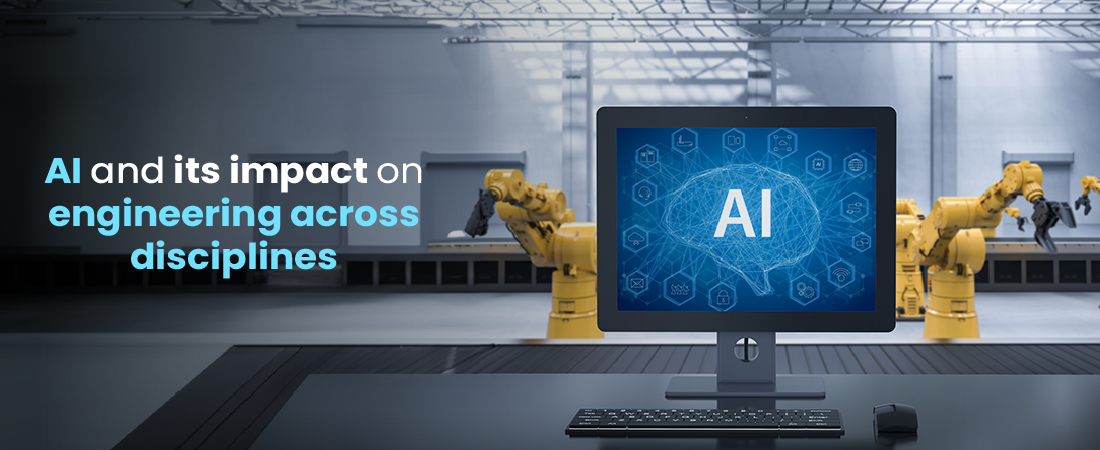
In the last few years, AI (Artificial Intelligence) and ML (Machine Learning) are among the most talked about spaces associated with Information Technology. Rapid developments in this space are significantly impacting almost every vertical ranging from education to healthcare to automotive.
Impact of AI technologies on different engineering disciplines.
An anticipated future trend is that the process of creating machine learning algorithms will also be automated, which opens up doors of opportunity hitherto never thought of.
Mechanical Engineering has challenges in terms of designing systems and components that deliver sustainability in addition to cost and energy efficiency. AI and data analytics can play a large role in this. Data science can be deployed to extract insights and knowledge from data that will help build effective AI models that develop systems capable of making effective predictions to help in decision making.
Mechanical engineering involves different stages - design, analysis and optimisation. Analysis and optimization depends on Computer-Aided Design (CAD) and 3D simulation (CAE) tools to assess if the product meets performance requirements.
AI and ML can also assist in enhancing efficiency and improving performance in manufacturing by analysing the wear and tear of critical components and providing alerts to the maintenance teams enabling them to service/ replace these components to ensure trouble free functioning.
Medical Electronics is all set to benefit from technologies such as Artificial Intelligence, Augmented/Extended Reality, IoT and Blockchain. Wearable gadgets are helping people track their health and be more aware of their conditions by monitoring their heart rate, BP, blood glucose, SPO2 etc.
Blockchain systems help healthcare companies securely store medical records of patients on the cloud within a highly secure fashion also enabling the information to be accessed remotely delivering the benefits of quality healthcare to patients in far flung areas.AI-based devices can help healthcare experts in processing information with accuracy to help doctors with diagnosis or create a treatment plan. ML can assist in assessing and experimenting on chemical reactions in the pharma industry. AI also holds the promise of providing targeted treatments for better results.
IoT is one of the fastest growing technologies touching various spheres and Internet of Medical Devices (IoMT) makes real-time monitoring of patients possible, providing accurate data for early treatment.
The Automotive Industry is being disrupted by AI. Some of the biggest developments include:
Self-driving cars: Several leading corporations such as Google, Uber and Tesla are testing self-driving cars on roads.
Connected cars: Cars with some form of internet connectivity are being developed which allows them to communicate with other devices. This enables infotainment, real-time traffic updates and diagnostic features.
Predictive maintenance: by leveraging data from sensors and connected devices, AI can help in predicting when a car’s component is likely to fail and needs replacement. This helps in reducing downtime and costly repairs.
Intelligent manufacturing: With AI, several manufacturing processes can be automated. Companies like Honda use AI-equipped robots to weld car parts together and Toyota is using AI to design better processes for the assembly line.
In Civil Engineering, AI is changing the status quo in more ways than one. AI models are making their way to develop projects that are more accurate and cheaper. AI is being used to plan the most optimised approach to electrical and plumbing systems. Various AI techniques are used in quality management, design optimization, maintenance and risk management.
Summing up, Artificial Intelligence is set to transform the various domains in engineering and its impact will have far reaching consequences in the coming years.
Dayananda Sagar College of Engineering (DSCE), part of Dayananda Sagar Institutions (DSI), offers UG and PG programs in various engineering streams including Mechanical, Civil, Electrical & Electronics, Computer Science, Medical Electronics and Chemical Engineering. AI and Robotics are imparted to students across streams depending on their relevance to their areas of specialisation. In addition DSCE offers a B. Tech in Robotics and AI, a 4 year full time program like all other UG engineering degree programs in DSCE.
Equipped with modern infrastructure and qualified & experienced faculty, DSCE constantly upgrades its curriculum in consultation with professionals from the industry. In fact, the institution has forged robust alliances with some of the leading names in the industry from across verticals.